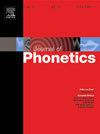你在沉沦什么?不熟悉口音的经历在词汇加工过程中产生抑制和促进作用
IF 2.4
1区 文学
0 LANGUAGE & LINGUISTICS
引用次数: 0
摘要
用不熟悉的口音说话可能会给听者带来挑战,导致处理延迟和/或可理解性降低。这种成本可能是由于听者对给定声音类别的语音实现方式的经验与不熟悉的说话者如何实现它之间的不匹配。语音不匹配会增加处理时间,但听众可以通过调整对特定说话者或语音种类的预期来避免这种情况。本研究探讨了语音范畴结构的变化如何促进(或抑制)对具有相同或语音相似口音的新词的加工,并询问这种适应是否由语音范畴边界的有针对性的转移或扩展所驱动。人工重音是通过将不发音的摩擦音/θ/和/s/变形来产生语音上的歧义[θ/s],这在消歧义/θ/词框架中呈现(例如,hypo[θ/s]etical)。为了研究语音学习对文字处理的影响,听者被分成三组,并被要求完成一项暴露任务,他们在任务中听到(1)重音关键/θ/单词,(2)自然(无重音)/θ/单词,或(3)无/θ/单词。然后,所有听众都完成了一个跨模态启动任务,在两个实验中,测试他们对用相同的人工口音或三种与训练口音语音匹配不同的相关口音产生的单词的处理能力。总体而言,研究结果表明,虽然先前的口音暴露对新单词的加工没有影响,但与没有先前口音暴露的听者相比,有先前口音暴露的听者在加工新单词时表现出明显的促进和抑制模式。有趣的是,先前听过非重读/θ/单词的听者倾向于模仿重读/θ/单词组,而不是对照组。讨论了声学/知觉相似性和先验经验的作用,以及这些结果对语音学习类别扩展机制的影响。本研究的所有数据、刺激和代码都可以通过https://osf.io/xw5k3/在OSF上免费获得。本文章由计算机程序翻译,如有差异,请以英文原文为准。
What are you sinking about? Experience with unfamiliar accent produces both inhibition and facilitation during lexical processing
Speech produced with an unfamiliar accent may pose a challenge for listeners, resulting in delayed processing and/or decreased intelligibility. Such costs may be due to a mismatch between listeners’ experience with how a given sound category is phonetically realized, and how it is implemented by an unfamiliar speaker. Phonetic mismatches can increase processing time, but listeners could avoid them by adjusting their expectations for a given speaker or speech variety. This study investigates how changes in phonetic category structure may facilitate (or inhibit) processing of novel words produced with either the same or a phonetically similar accent, asking whether such adaptation is driven by a targeted shift or expansion of phonetic category boundaries. An artificial accent was created by morphing voiceless fricatives /θ/ and /s/ to create phonetically ambiguous [θ/s], which was presented in disambiguating /θ/ word frames (e.g., hypo[θ/s]etical). To examine the effect of phonetic learning on word processing, listeners were divided into three groups and asked to complete an exposure task where they heard either (1) accented critical /θ/ words, (2) natural (unaccented) /θ/ words, or (3) no /θ/ words. All listeners then completed a cross-modal priming task where, across two experiments, they were tested on their processing of words produced with the same artificial accent or three related accents differing in their phonetic match to the training accent. Overall, results show that while there was no effect of prior exposure on processing of novel words produced with the exposure accent, listeners with prior accent exposure showed a distinct pattern of facilitation and inhibition when processing words produced with the novel accents, compared to listeners with no prior accent exposure. Interestingly, listeners with prior exposure to unaccented /θ/ words tended to pattern with the accented /θ/ exposure group, rather than with controls. The role of acoustic/perceptual similarity and prior experience are discussed, along with implications of these results for a category expansion mechanism of phonetic learning.
All data, stimuli, and code for this study are freely available on OSF via https://osf.io/xw5k3/.
求助全文
通过发布文献求助,成功后即可免费获取论文全文。
去求助
来源期刊

Journal of Phonetics
Multiple-
CiteScore
3.50
自引率
26.30%
发文量
49
期刊介绍:
The Journal of Phonetics publishes papers of an experimental or theoretical nature that deal with phonetic aspects of language and linguistic communication processes. Papers dealing with technological and/or pathological topics, or papers of an interdisciplinary nature are also suitable, provided that linguistic-phonetic principles underlie the work reported. Regular articles, review articles, and letters to the editor are published. Themed issues are also published, devoted entirely to a specific subject of interest within the field of phonetics.
 求助内容:
求助内容: 应助结果提醒方式:
应助结果提醒方式:


